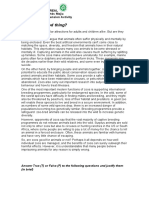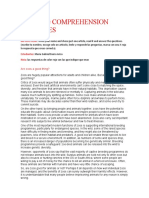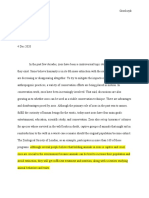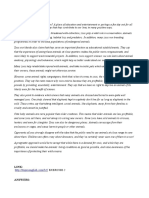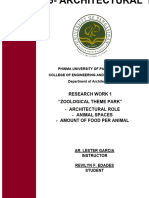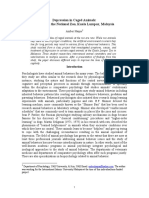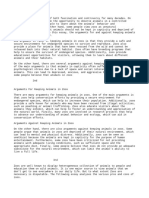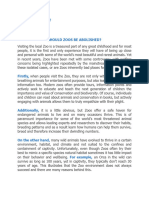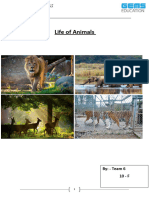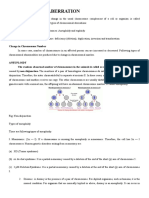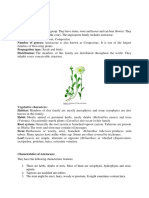Самостійна робота № 7
Самостійна робота № 7
Uploaded by
holy persimmonOriginal Description:
Original Title
Copyright
Available Formats
Share this document
Did you find this document useful?
Is this content inappropriate?
Report this DocumentCopyright:
Available Formats
Самостійна робота № 7
Самостійна робота № 7
Uploaded by
holy persimmonCopyright:
Available Formats
Самостійна робота № 7
1. Be ready for the quiz (Ex. 1, 3).
2. Use the information in Ex. 14 to write a magazine article about whether
animals should be kept in zoos (150-200 words).
Should Animals Be Kept in Zoos?
Proponents of zoos point to the fact that they educate the general public, are beneficial
for scientific research, and work toward conservation efforts and captive breeding. At
the San Francisco Zoo, there are educational programs for children ages 1-17. From
camps, to mobile programs that bring smaller animals to schools, to family activities
that look at local wildlife near the zoo, the public is able to get hands-on education
about animals they may not be able to meet and learn about otherwise. The Lindsay
Wildlife Experience in Walnut Creek, California, offers similar experiences to connect
locals with wildlife and educate people on how they can do small things to help benefit
wildlife in urban areas. Zoos can also be beneficial for scientific research. Studies are
sometimes better able to be completed in zoos because of the controlled environment of
a zoo. Lastly, zoos help endangered populations by using captive breeding and release.
The AZA’s Species Survival Plan Program is a long-term plan that incorporates
conservation breeding, preservation of habitat, education and research to support the
survival of threatened and endangered species. Many zoos also work on local
conservation efforts to maintain local wildlife populations.
On the other hand, many would say that wild animals should not be held in captivity. It
has been argued that captive breeding isn’t always effective, zoos do not provide
natural habitats, and that zoos put unnecessary stress on animals. Some studies have
shown that reintroduced animals have high mortality rates because they are poorly
adapted and lack the skills needed to survive in the wild. Since an animal’s well-being
is dependent on their environment, some contend that zoos do not provide healthy
habitats for animals. Enclosures--even when designed to mimic an animal’s natural
habitat--are still not really natural. And, zoos can’t really provide the space that large or
wide-ranging animals, like elephants, are used to. Due in part to unnatural enclosures,
animals in zoos are under stress. Animals are often bored and, as a result, some become
aggressive and can lash out at other animals or zookeepers. In a study done on 40
chimpanzees in six different zoos, all of the chimps exhibited behavior their
counterparts in nature did not. Some of these behaviors included rocking back and
forth, tearing out their hair, self-mutilation, and the drinking of their urine. This
behavior is not seen in their wild counterparts suggesting that being in the zoo is
causing these chimps to develop mental illness due to stress.
You might also like
- MOdule 5-PAST HSC QUESTIONS WITH ANSWERS PDFDocument52 pagesMOdule 5-PAST HSC QUESTIONS WITH ANSWERS PDFKevin100% (1)
- Animals in CaptivtyDocument14 pagesAnimals in Captivtyapi-509417653Noch keine Bewertungen
- Should Animals Be Kept in Zoos - 2Document1 pageShould Animals Be Kept in Zoos - 2thientrang010891Noch keine Bewertungen
- Synthesis EssayDocument8 pagesSynthesis Essaynhinhinhi3333Noch keine Bewertungen
- Are Zoos A Good ThingDocument2 pagesAre Zoos A Good ThingMiroslavaNoch keine Bewertungen
- GR 8 Argumentative - Final Document With Typed EssaysDocument25 pagesGR 8 Argumentative - Final Document With Typed EssaysCattrina GraggNoch keine Bewertungen
- ZOO (Questions)Document3 pagesZOO (Questions)JUAN CAMILO DIAZ PALOMANoch keine Bewertungen
- Reading Comprehension Exercises: InstructionsDocument2 pagesReading Comprehension Exercises: InstructionsGabriel Sierra CNoch keine Bewertungen
- Argument Essay Final-2Document5 pagesArgument Essay Final-2api-582521089Noch keine Bewertungen
- PromptDocument1 pagePromptMuhd NaimNoch keine Bewertungen
- UWRT Portfolio-1Document9 pagesUWRT Portfolio-1Taylor MurrmannNoch keine Bewertungen
- 8 List of Pros and Cons of ZoosDocument5 pages8 List of Pros and Cons of Zoosmcfs_bulacan100% (1)
- Argumentative Essay For EnglishDocument6 pagesArgumentative Essay For EnglishPaul GNoch keine Bewertungen
- Holly Essay 3 FinalDocument5 pagesHolly Essay 3 Finalapi-711356676Noch keine Bewertungen
- UWRT Porfolio With CommentsDocument5 pagesUWRT Porfolio With CommentsTaylor MurrmannNoch keine Bewertungen
- UNIT 7 - Are Zoos Good ThingsDocument3 pagesUNIT 7 - Are Zoos Good ThingsFransiska 788Noch keine Bewertungen
- Topic 17 Animals in ZoosDocument1 pageTopic 17 Animals in ZoosOlga DawidenkoNoch keine Bewertungen
- Research Paper Topics On ZoosDocument6 pagesResearch Paper Topics On Zoosoqphebaod100% (1)
- Unit 8: BahasainggrisuniversitasjenderalsoedirmanDocument3 pagesUnit 8: BahasainggrisuniversitasjenderalsoedirmanFarahNoch keine Bewertungen
- Argumentative Essay For EnglishDocument6 pagesArgumentative Essay For EnglishPaul GNoch keine Bewertungen
- Pros Cons 2 of ZoosDocument3 pagesPros Cons 2 of Zoosapi-170235603Noch keine Bewertungen
- The Tapescript-The ZoosDocument2 pagesThe Tapescript-The ZoosCarmen Nebreda QuintanaNoch keine Bewertungen
- Are Zoos A Good ThingDocument2 pagesAre Zoos A Good Thingquoc anh nguyenNoch keine Bewertungen
- Are Zoos A Good ThingDocument2 pagesAre Zoos A Good ThingFarzam Garshasbi0% (1)
- Final Draft For Advocacy ProjectDocument16 pagesFinal Draft For Advocacy Projectapi-439832197Noch keine Bewertungen
- Are Zoos A Good Thing?Document2 pagesAre Zoos A Good Thing?Даша Мар'яшNoch keine Bewertungen
- What Are The Pros of Having ZoosDocument2 pagesWhat Are The Pros of Having ZoosMuzz MuzzaffarNoch keine Bewertungen
- Research MarkDocument4 pagesResearch Markjoel gabaoNoch keine Bewertungen
- Model Essay The Advantages and Disadvantages of Keeping Wild Animals in Zoos Yzwmk7Document2 pagesModel Essay The Advantages and Disadvantages of Keeping Wild Animals in Zoos Yzwmk7Bich Hanh VoNoch keine Bewertungen
- Argument Essay-FinalDocument4 pagesArgument Essay-Finalapi-319633256Noch keine Bewertungen
- Research Paper Zoo or No ZooDocument6 pagesResearch Paper Zoo or No Zooapi-500454060Noch keine Bewertungen
- Importance of ZoosDocument10 pagesImportance of ZoosKaarri DeMarcoNoch keine Bewertungen
- Ugyen PeljorDocument7 pagesUgyen PeljorUgyen PenjorNoch keine Bewertungen
- What Are The Cons of Having ZDocument6 pagesWhat Are The Cons of Having Zakinimod avorogeNoch keine Bewertungen
- Annotated BlibliographyDocument5 pagesAnnotated Blibliographyapi-382506756Noch keine Bewertungen
- Literature ReviewDocument15 pagesLiterature Reviewapi-357630505Noch keine Bewertungen
- Full PaperDocument11 pagesFull Paperapi-423505262Noch keine Bewertungen
- Research Paper Over ZoosDocument7 pagesResearch Paper Over Zoosvehysad1s1w3100% (1)
- To Feed or Folly?: Animal-Visitor Interaction in U.S. ZoosDocument10 pagesTo Feed or Folly?: Animal-Visitor Interaction in U.S. ZooscarolineCAY25Noch keine Bewertungen
- Should Animals Be Kept in ZoosDocument2 pagesShould Animals Be Kept in ZoosEdo RinaldoNoch keine Bewertungen
- Arc 006 RSW Zoological Theme ParkDocument11 pagesArc 006 RSW Zoological Theme ParkAngelica MercadoNoch keine Bewertungen
- Benefits of ZoosDocument4 pagesBenefits of ZoosQuoc Thai NguyenNoch keine Bewertungen
- Depression in Caged Animals: A Study at The National Zoo, Kuala Lumpur, MalaysiaDocument12 pagesDepression in Caged Animals: A Study at The National Zoo, Kuala Lumpur, MalaysiaSilvina PezzettaNoch keine Bewertungen
- AutorDocument2 pagesAutorMD Rayhan RajuNoch keine Bewertungen
- Pros Con On ZoosDocument4 pagesPros Con On Zoosapi-170235603Noch keine Bewertungen
- Scientist David Hone Makes The Case For Zoos: Reading PassageDocument2 pagesScientist David Hone Makes The Case For Zoos: Reading PassagesasaemNoch keine Bewertungen
- PW Discursive Exemplar 2Document1 pagePW Discursive Exemplar 2Craft CityNoch keine Bewertungen
- Digital ProductDocument12 pagesDigital ProductIrfan JamalNoch keine Bewertungen
- Group 5 Research 1Document36 pagesGroup 5 Research 1Taehyung KimNoch keine Bewertungen
- Research Assessment 1Document11 pagesResearch Assessment 1api-476794273Noch keine Bewertungen
- Balanced Report-ZoosDocument2 pagesBalanced Report-Zoossamupul19Noch keine Bewertungen
- Zoo ThesisDocument6 pagesZoo ThesisPayForAPaperSingapore100% (2)
- Why The World Needs Zoos - DR Dave HoneDocument4 pagesWhy The World Needs Zoos - DR Dave Honedubois antoineNoch keine Bewertungen
- The Pros of Zoos ExploredDocument3 pagesThe Pros of Zoos Exploredkaren reyesNoch keine Bewertungen
- Eapp Position PaperDocument2 pagesEapp Position PaperShemaiah CadapanNoch keine Bewertungen
- READING PASSAGE 2 Why Zoos Are GoodDocument4 pagesREADING PASSAGE 2 Why Zoos Are GoodemNoch keine Bewertungen
- Final PPR 1Document14 pagesFinal PPR 1api-529693533Noch keine Bewertungen
- ZOOSDocument2 pagesZOOSGirl OneNoch keine Bewertungen
- Wild Animals Should Not Be Kept in CaptivityDocument3 pagesWild Animals Should Not Be Kept in CaptivityLauren Halleran0% (1)
- Life of Animals in Zoo - 2020 - 91064Document11 pagesLife of Animals in Zoo - 2020 - 91064OmkarNoch keine Bewertungen
- What's Wrong With My Snake? (advanced Vivarium Systems)From EverandWhat's Wrong With My Snake? (advanced Vivarium Systems)Rating: 4 out of 5 stars4/5 (5)
- Report Text of Sumatran TigerDocument6 pagesReport Text of Sumatran TigerdiniNoch keine Bewertungen
- Modified Leaves, Stems, and RootsDocument16 pagesModified Leaves, Stems, and RootsMerrylFranciscoNoch keine Bewertungen
- Chromosome AberrationDocument37 pagesChromosome AberrationAli Abbas AslamNoch keine Bewertungen
- BBL331 Course ContentDocument1 pageBBL331 Course ContentRoshineeNoch keine Bewertungen
- Honors Bio POGIL Prokaryotic and Eukaryotic CellsDocument6 pagesHonors Bio POGIL Prokaryotic and Eukaryotic CellsRhianna TetlowNoch keine Bewertungen
- Test Review - Cells, Cell Transportation and Communication: Unit ObjectivesDocument5 pagesTest Review - Cells, Cell Transportation and Communication: Unit ObjectivesCole McFarlandNoch keine Bewertungen
- Nursery Booklet A4 VersionDocument13 pagesNursery Booklet A4 Versionapi-553512827Noch keine Bewertungen
- CMC Zoo ArticleDocument2 pagesCMC Zoo Articleapi-280696015Noch keine Bewertungen
- Pollination and FertilizationDocument2 pagesPollination and FertilizationStudy SuccessNoch keine Bewertungen
- STPPT1 Life Processes Interactions and AdaptationsDocument24 pagesSTPPT1 Life Processes Interactions and AdaptationsIVAN GLENN NAGALNoch keine Bewertungen
- Tapir en ExtnDocument174 pagesTapir en ExtnsolerNoch keine Bewertungen
- Bulletin: Department of Biological Sciences Bachelor of Science Degrees (Biomedical Emphasis Zoology Emphasis)Document25 pagesBulletin: Department of Biological Sciences Bachelor of Science Degrees (Biomedical Emphasis Zoology Emphasis)Ji-Shawn PardassieNoch keine Bewertungen
- TRB PGT Botany Answer Key by Dr. T.vijaya Kumar Sri Vijay Study CenterDocument7 pagesTRB PGT Botany Answer Key by Dr. T.vijaya Kumar Sri Vijay Study CenterThiruselvam B PositiveNoch keine Bewertungen
- Laboratory Notes For BIO 1003Document7 pagesLaboratory Notes For BIO 1003kedahn9Noch keine Bewertungen
- Fundamentals of Plant Biology (Bio 103)Document44 pagesFundamentals of Plant Biology (Bio 103)Monique NavarraNoch keine Bewertungen
- Biotechnology & Drug Discovery.Document35 pagesBiotechnology & Drug Discovery.IrsaNoch keine Bewertungen
- Virus Oncolytic Sebagai Agen Terapi Untuk Kanker ProstatDocument18 pagesVirus Oncolytic Sebagai Agen Terapi Untuk Kanker ProstatReza SudrajatNoch keine Bewertungen
- Chir PineDocument13 pagesChir PinekaifiahmedNoch keine Bewertungen
- Admisssion Test: BS (Biotechnology)Document5 pagesAdmisssion Test: BS (Biotechnology)Abdul ZamirNoch keine Bewertungen
- RujukanDocument5 pagesRujukanKhairul ShahmiNoch keine Bewertungen
- The Phosphorus CycleDocument10 pagesThe Phosphorus CycleJameili ThomasNoch keine Bewertungen
- Upstream b1 Teachers Workbookpdf PDFDocument116 pagesUpstream b1 Teachers Workbookpdf PDFLuka Bukuri100% (1)
- Distribution and Status of The Indian Fox Vulpes BDocument6 pagesDistribution and Status of The Indian Fox Vulpes Bmamillapalli sri harshaNoch keine Bewertungen
- Development: Flowering TransitionDocument3 pagesDevelopment: Flowering TransitionNovember RolfNoch keine Bewertungen
- SCIENCE-9 Q1 W5 Mod5 ADMDocument19 pagesSCIENCE-9 Q1 W5 Mod5 ADMMönica MasangkâyNoch keine Bewertungen
- Bio 134 Chapter 19-20 Practice TestDocument6 pagesBio 134 Chapter 19-20 Practice TestTauqeerAhmadRajput50% (2)
- Scope Life SC 2021 Grade 10Document4 pagesScope Life SC 2021 Grade 10Poky MngqibisaNoch keine Bewertungen
- Human Genome ProjectDocument7 pagesHuman Genome ProjectAfrozNoch keine Bewertungen
- Family AsteraceaeDocument4 pagesFamily AsteraceaeZainab MalikNoch keine Bewertungen






